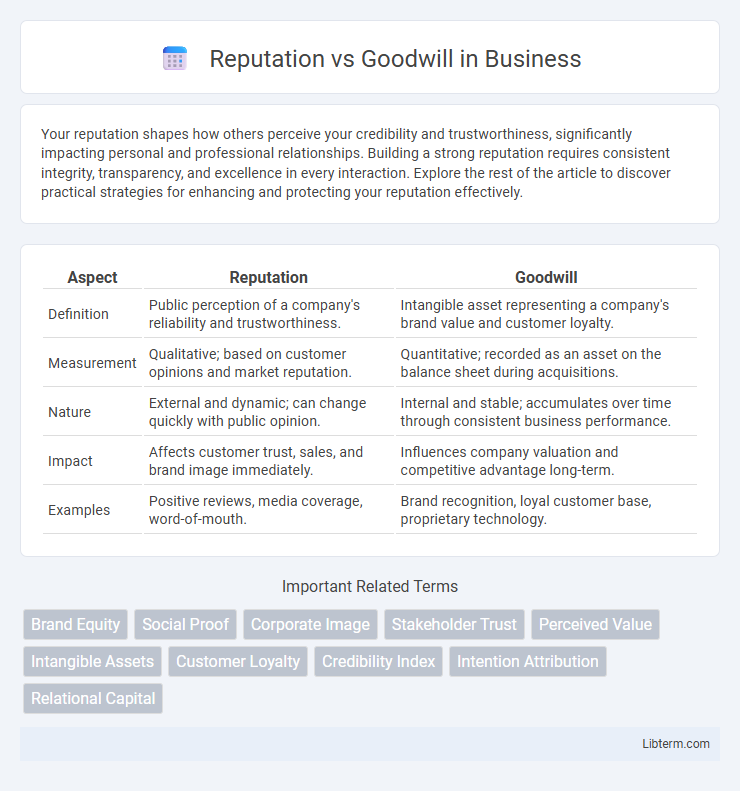Your reputation shapes how others perceive your credibility and trustworthiness, significantly impacting personal and professional relationships. Building a strong reputation requires consistent integrity, transparency, and excellence in every interaction. Explore the rest of the article to discover practical strategies for enhancing and protecting your reputation effectively.
Table of Comparison
| Aspect | Reputation | Goodwill |
|---|---|---|
| Definition | Public perception of a company's reliability and trustworthiness. | Intangible asset representing a company's brand value and customer loyalty. |
| Measurement | Qualitative; based on customer opinions and market reputation. | Quantitative; recorded as an asset on the balance sheet during acquisitions. |
| Nature | External and dynamic; can change quickly with public opinion. | Internal and stable; accumulates over time through consistent business performance. |
| Impact | Affects customer trust, sales, and brand image immediately. | Influences company valuation and competitive advantage long-term. |
| Examples | Positive reviews, media coverage, word-of-mouth. | Brand recognition, loyal customer base, proprietary technology. |
Introduction: Defining Reputation and Goodwill
Reputation refers to the collective perception held by stakeholders based on past actions, reliability, and overall credibility of a business or individual. Goodwill represents the intangible asset arising from a company's strong reputation, customer loyalty, brand value, and other non-physical factors that contribute to future earnings. Both concepts influence market position but differ in their accounting treatment and legal implications.
Key Differences Between Reputation and Goodwill
Reputation reflects public perception of a brand's or individual's trustworthiness and performance, shaped by past actions and customer experiences. Goodwill represents the intangible asset value attributed to a business, including customer loyalty, brand strength, and relationships, often quantified during acquisitions. While reputation influences market perception and future earnings, goodwill is recorded on financial statements and impacts the company's overall valuation.
The Role of Reputation in Business Success
Reputation significantly influences business success by establishing trust and credibility with customers, investors, and partners, which drives customer loyalty and long-term profitability. A strong reputation enhances brand equity, facilitates market differentiation, and attracts high-quality talent, ultimately supporting sustainable growth. Companies with positive reputations experience lower marketing costs and increased resilience during crises, underscoring reputation's critical role in competitive advantage.
How Goodwill Impacts Business Valuation
Goodwill significantly impacts business valuation by representing intangible assets such as brand reputation, customer loyalty, and intellectual property that enhance a company's market worth beyond its tangible assets. It reflects the premium buyers are willing to pay for an established business with strong customer relationships and positive market presence. Accurate valuation of goodwill is crucial during mergers and acquisitions to determine the true value and competitive advantage of the company.
Building a Positive Reputation: Strategies and Tactics
Building a positive reputation involves consistently delivering quality products and excellent customer service to foster trust and loyalty among stakeholders. Implementing transparent communication, actively engaging with the community, and promptly addressing feedback contribute to strengthening a brand's credibility and public image. Strategic use of social proof, such as testimonials and positive reviews, enhances visibility and reinforces a strong, reputable market presence.
Measuring Goodwill in Financial Statements
Goodwill in financial statements is measured as the excess amount paid over the fair value of identifiable net assets during an acquisition, reflecting intangible assets such as brand reputation, customer loyalty, and intellectual property. Unlike reputation, which is intangible and subjective, goodwill is quantifiable and recorded on the balance sheet as an asset. The impairment test is essential to assess if the recorded goodwill's carrying value exceeds its fair value, ensuring accurate financial reporting.
Reputation Management: Tools and Best Practices
Reputation management involves monitoring and influencing public perception through tools such as social media analytics, online review platforms, and sentiment analysis software. Best practices include proactive engagement with customers, timely response to negative feedback, and consistent brand messaging across digital channels. Leveraging these strategies enhances trust, mitigates crises, and strengthens long-term organizational reputation.
The Influence of Goodwill on Customer Trust
Goodwill significantly enhances customer trust by reflecting a company's strong relationships and positive customer perceptions built over time. This intangible asset, often resulting from consistent quality, ethical practices, and brand loyalty, boosts confidence in a brand's reliability and integrity. As a critical component of overall brand valuation, goodwill directly influences customer decisions and long-term business success.
Case Studies: Reputation vs Goodwill in Real Businesses
Case studies reveal that reputation and goodwill, while interconnected, impact businesses differently; for example, Johnson & Johnson's strong reputation for product safety helped restore goodwill after the Tylenol crisis, boosting customer trust and sales recovery. Conversely, Volkswagen's emissions scandal severely damaged both reputation and goodwill, resulting in long-term financial and brand value losses despite efforts to rebuild trust. These examples highlight how maintaining a positive reputation can safeguard and enhance goodwill, which translates into tangible business value.
Conclusion: Balancing Reputation and Goodwill for Long-Term Growth
Balancing reputation and goodwill is essential for sustainable long-term growth, as reputation reflects the tangible perception of a business's reliability and performance, while goodwill represents the intangible value derived from customer loyalty and brand affinity. Companies that strategically nurture both elements can enhance customer trust, market positioning, and financial stability. Prioritizing reputation management alongside proactive goodwill-building initiatives creates a resilient foundation for enduring competitive advantage.
Reputation Infographic

 libterm.com
libterm.com